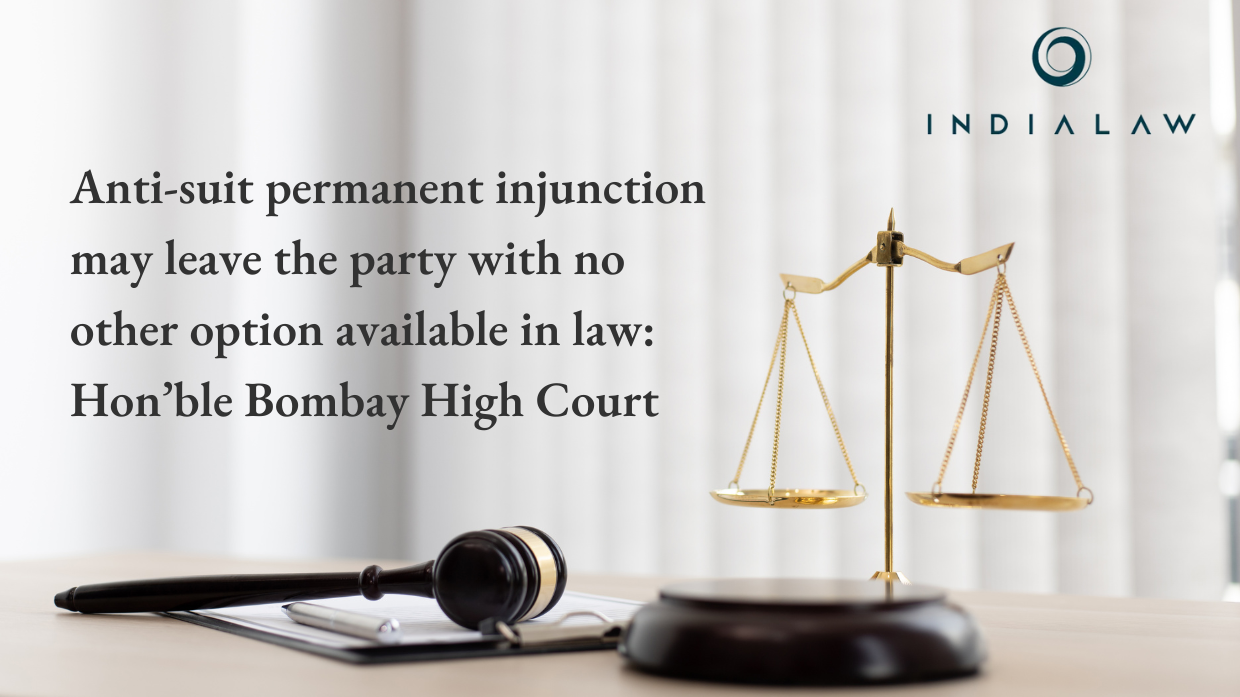Anti-suit permanent injunction may leave the party with no other option available in law: Hon’ble Bombay High Court

In a recent noteworthy decision, the Hon’ble Bombay High Court[i] has granted interim relief to Mr. Anupam Mittal, the founder of Shaadi.com, by staying an anti–suit permanent injunction order directed by the Hon’ble Singapore High Court.
The genesis of the dispute between Mr. Mittal and his co–shareholders was a Shareholding Agreement dated 10.02.2006 [“SHA”] between them. Mr. Mittal initiated proceedings in 2021 before the National Company Law Tribunal, Mumbai, [“NCLT”] alleging Oppression and Mismanagement [“O&M”]. Pertinently, the SHA contained an arbitration clause which provided for arbitration at Singapore, under Singapore law.
Hence, the defendants initiated proceedings before the Singapore High Court shortly after the initiation of the NCLT proceedings and requested for the grant of an anti – suit permanent injunction[ii] against the NCLT proceedings. The Singapore High Court granted the anti – suit permanent injunction and the matter was carried in appeal to the Court of Appeal at Singapore. The Court of Appeal upheld the anti – suit permanent injunction order.
In addition to these proceedings, Mr. Mittal filed a suit before the Hon’ble Bombay High Court, and an interim application was made requesting stay on the anti – suit permanent injunction of the Singapore High Court.
The contentions on behalf of the plaintiff were that firstly, the interim application for stay of the Singapore High Court’s order was in the nature of an anti – enforcement injunction[iii]. This, being a species of injunction, would necessitate the three – pronged test of prima facie case, irreparable loss caused to the plaintiff, and the balance of convenience being in favour of the plaintiff. Second, NCLT had exclusive jurisdiction to adjudicate O&M disputes per the law laid down by courts in India, public policy of India, as well as the statutory mandate of the Companies Act, 2013[iv].
Third, though the arbitration clause between the parties stated that the arbitration would be conducted at Singapore and under Singapore law, it also provided that enforcement of any arbitration award would be conducted in India and as per the Indian Arbitration and Conciliation Act, 1996 [“A&C Act”]. Fourth, any disputes relating to O&M were non – arbitrable in nature per the law laid down by courts in India and the public policy of India.
Fifth, since the A&C Act governed enforcement of the arbitration award, any award on the O&M disputes between the parties would be barred from enforcement in India since O&M disputes are non – arbitrable in nature. Sixth, an award on the parties’ O&M dispute being unenforceable in India coupled with the fact that the Singapore High Court had barred the plaintiff from approaching the NCLT for adjudication on the parties’ O&M dispute rendered the plaintiff remediless.
Seventh, the defendants possessed alternate remedy under section 45 of the A&C Act which permits for any judicial body to submit parties to arbitration if an arbitration clause persists between them. In light of the above, it was argued that, the three – pronged test had been successfully proved by the plaintiff and stay must be granted on the Singapore High Court’s order barring the plaintiff from proceeding in the NCLT.
The defendants’ contentions were that that dispute was purely contractual in nature and not relating to O&M as alleged by the plaintiff. In this manner, the exclusive jurisdiction on the present dispute rested with the arbitral tribunal at Singapore. In this manner, the order of the Singapore High Court was requested to be upheld and the relief sought by the plaintiff was requested to be denied.
The Hon’ble Bombay High Court decided in favour of the plaintiff, Mr. Mittal, and directed stay on the Singapore High Court’s order permanently injuncting the NCLT proceedings.
It was held that, the present application was an anti – enforcement injunction and the three – pronged test would apply. Second, NCLT possessed exclusive jurisdiction in O&M cases in India as per the law laid down by the courts in India and the statutory mandate. Third, O&M cases are non – arbitrable in nature per the decisions of various courts in India, public policy of India, and the fact that they are governed by a special enactment. Fourth, since the arbitration clause provides for enforcement under the A&C Act, Indian law would apply in respect of the O&M disputes between the parties.
Fifth, the plaintiff would be left remediless if the order of the Singapore High Court was allowed to persist. Thus, a strong prima facie case had been established by the plaintiff. Sixth, the Hon’ble Bombay High Court declared that the NCLT possessed exclusive jurisdiction in hearing the O&M petition and it did not want to entrench on this jurisdiction by offering its opinion on the petition itself. If the defendants wished to question the petition, they were required to do so before the NCLT and the remedy under section 45 of the A&C Act were always available to them.
In the opinion of the authors, this judgment of the Hon’ble Bombay High Court is valuable for the reasons that, it declares that O&M cases fall under the exclusive jurisdiction of the NCLT under Indian law. Therefore, O&M cases are also non – arbitrable in nature. Next, it declares the principles governing grant of an anti – enforcement injunction. Thus, it would be a useful authority on the said principles while applying for similar reliefs in a future case.
[i] Anupam Mittal v. People Interactive (India) Pvt. Ltd. and Ors. (I. A. No. 1010 of 2021 in Suit No. 95 of 2021) [judgment and order dated 11th September, 2023]. The coram consisted of Hon’ble Mr. Justice Manish Pitale.
[ii] ‘anti – suit permanent injunction’ means a permanent injunction granted by a judicial body restraining a party from initiating any proceedings qua the same dispute before another judicial body.
[iii] ‘anti – enforcement injunction’ means an injunction granted by a judicial body whereby it restrains a party from enforcing an order of another judicial body. This does not necessarily mean the injunction must be granted by a superior court, as observed in the present case.
[iv] Sections 241, 242 and 430 of the Companies Act, 2013.
By entering the email address you agree to our Privacy Policy.



